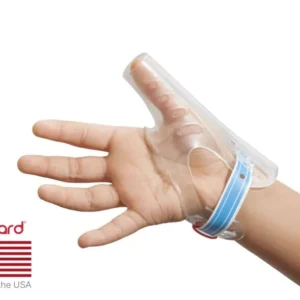Nearly all babies suck their thumb or finger as this is a natural reflex and part of development. Infants suck their thumb because it releases endorphins which soothe their little bodies, encouraging a feeling of comfort. However, that endorphin release can become addictive, and some babies suck their thumbs into childhood, which can impact jaw development. The good news is that child health specialists can help! Learn about the role of orthodontists in curbing thumb sucking.
What is an Orthodontist?
We all go to the dentist at least twice a year to check our teeth and get them cleaned. An orthodontist is a type of dentist who focuses on correcting or preventing irregularities in teeth and jaw alignment. They have extensive knowledge and training in identifying potential issues in the mouth’s structure and providing specialized treatments to correct them.
Often, parents bring their children to the orthodontist to evaluate misaligned teeth. Orthodontists can also help correct jaw and bite issues related to thumb sucking, including:
- Overbites: The upper front teeth protrude beyond the lower teeth.
- Underbites: The lower teeth stick out past the upper teeth.
- Crossbites: The upper and lower jaws do not align properly, causing one or more teeth to bite on the inside of the opposite jaw.
- Open bites: The top and bottom front teeth do not touch when biting down.
- Protruding teeth: The front teeth stick out, they are more susceptible to injury.
- Crowded or crooked teeth: The mouth has insufficient space for permanent teeth to come in properly.
If the jaw does not develop correctly, it can impair chewing, speaking, and, in severe cases, breathing. Since orthodontists specialize in this, they can help correct the issue with braces or other devices to improve jaw alignment and prevent future problems.
When Should Kids Visit an Orthodontist?
Hearing about the negative effects of thumb sucking can leave any parent worried and thinking their child should visit an orthodontist immediately. However, this isn’t always the case, as thumb sucking is generally safe up until the ages of four to six years old. The habit becomes concerning in early childhood because they’ll lose teeth as their jaw develops.
Before searching for an orthodontist, ask your child’s dentist for recommendations. Most experts recommend that children start seeing a dentist at around six months old.
Talking to your child’s dentist first can also help you see if they recommend any orthodontists they work with. This will make the transition to an orthodontist smoother since you already have a referral from someone you trust and your child is comfortable with.
How an Orthodontist Can Help?
Orthodontists play a crucial role in addressing thumb-sucking habits and their effects. They use various methods to educate, assess, and treat children, ensuring their oral health stays on track.
Explain the Issue
Orthodontists can help educate you and your child on thumb-sucking results and how it can hurt the body. When talking to your child, they may explain that their habit can cause crowded or crooked teeth, impair jaw development, and even impact speech.
Orthodontists can also explain how specific treatments, such as braces, work if needed. By involving your child in their oral health care, they may be more willing to cooperate and take on a proactive role in stopping thumb-sucking.
A Bonus
Kids have curious minds and an orthodontist can easily answer all those “why” questions.
Assess the Jaw and Palate
During your child’s appointment, the orthodontist can evaluate your child’s jaw and do X-rays to determine any abnormalities. They may also assess the palate to see if there is enough room for permanent teeth; a high or narrow palate can make it difficult for teeth to come in properly.
Help End the Habit
Orthodontists offer valuable guidance and strategies to help children stop thumb-sucking. Positive reinforcement techniques, such as reward systems, encourage children to actively break the habit. Orthodontists may also work with parents to develop behavioral strategies customized to the child’s age and personality.
Orthodontists can also provide behavioral tips that may help your child stop thumb-sucking. This can include positive reinforcement techniques such as rewarding your child for not sucking their thumb or using thumb-sucking gloves.
Pro Tip
TGuard’s thumb-sucking glove slides over your child’s hand without restricting daily movement. The holes along the side of the glove prevent the creation of suction, making sucking less enjoyable.
Offer Treatment Options
If the orthodontist concludes that your child’s jaw is not developing correctly due to thumb sucking, they may recommend treatment options. While braces help align teeth, a palate expander can help make room for teeth attempting to erupt into a crowded space. In more severe cases, a child may require surgery to correct the jaw alignment to ensure healthy oral development.
How to Help Your Child
Understanding the role of orthodontists is the first step in curbing thumb sucking. As a parent, you can also help your child by encouraging them to stop and providing support throughout the process.
Have the Conversation
Going to any healthcare professional can be scary for a child, so have an age-appropriate conversation about who you’ll see and why. Explain that an orthodontist is similar to a dentist but focuses on ensuring the jaw develops properly rather than cleaning the teeth.
Be Consistent
Breaking a habit requires routine and being consistent with your child. Remind them to stop sucking their thumb anytime you see them doing it. Likewise, if your child uses thumb-sucking guards or gloves, regularly put them on your child until they no longer need them. You can also create a reward system to encourage positive behavior.
Work Together
Parents and children should approach the transition as a team effort. Collaborating on solutions ensures that the child feels supported and involved. Help your child find coping mechanisms they’d like to try instead of thumb-sucking and praise their efforts.
Celebrate Progress
Stopping thumb-sucking is a big accomplishment for a child, so every small step forward is worth celebrating. Acknowledging milestones with praise or small rewards keeps children motivated and reinforces their commitment to breaking the habit. Positive reinforcement helps build confidence and fosters a sense of achievement.
By working with an orthodontist, you can help your child overcome thumb sucking and prevent any potential issues with their jaw or teeth. Be consistent, provide support throughout the process, and celebrate each milestone as your child breaks the habit. Help your child achieve a healthy, confident smile by addressing thumb-sucking habits early and seeking expert guidance.






